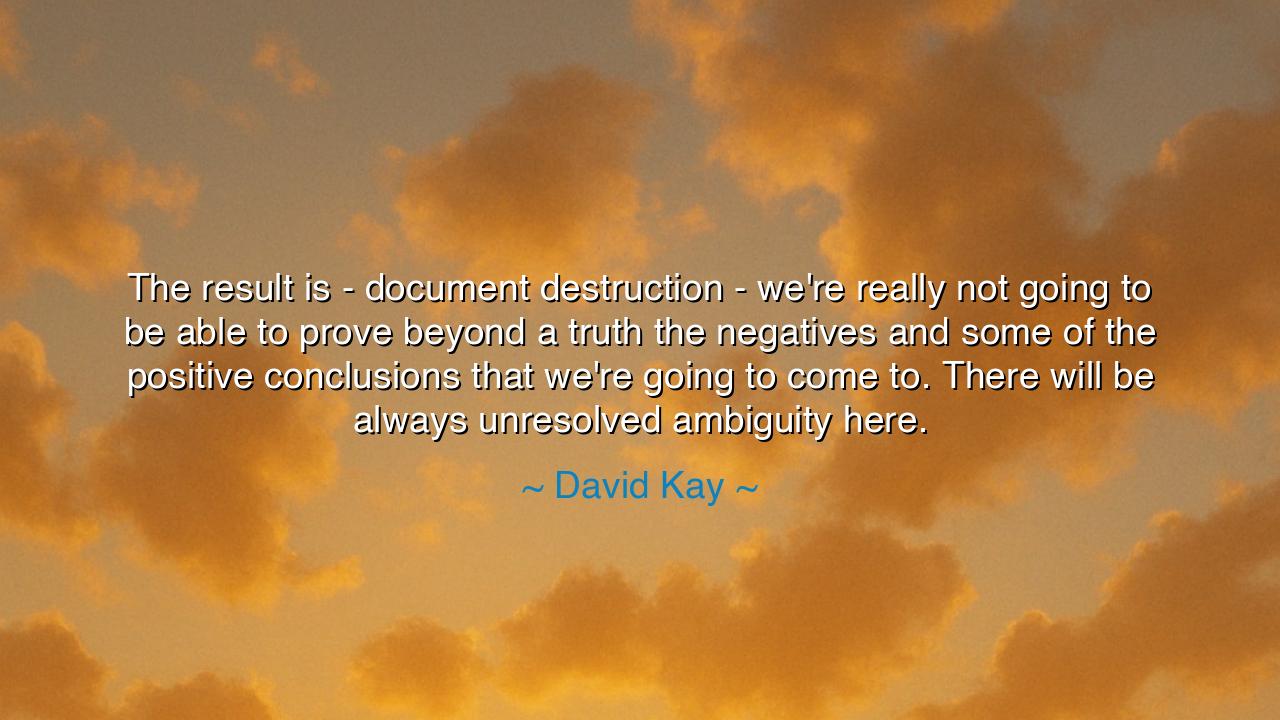
The result is - document destruction - we're really not going to
The result is - document destruction - we're really not going to be able to prove beyond a truth the negatives and some of the positive conclusions that we're going to come to. There will be always unresolved ambiguity here.






Hear the somber words of David Kay: “The result is—document destruction—we’re really not going to be able to prove beyond a truth the negatives and some of the positive conclusions that we’re going to come to. There will be always unresolved ambiguity here.” In this statement lies the sorrow of the seeker of truth, who finds his path clouded not by lack of will, but by the deliberate erasure of evidence. For when the scrolls are burned, the records torn, and the traces of deeds destroyed, certainty itself is murdered, and mankind is left with shadows instead of knowledge.
The ancients knew this anguish well. When the Library of Alexandria was consumed by flame, not only papyrus but centuries of wisdom perished. Questions of the heavens, of medicine, of the mysteries of the earth—all vanished, leaving behind silence where there once was light. What Kay describes in document destruction is but a modern echo of this tragedy: that power often chooses to erase, so that truth may never accuse it.
Consider the trial of Socrates. The charges against him were crafted not from written law alone but from rumors, interpretations, and the passions of his accusers. With no faithful record of his defense but what his disciples preserved, ambiguity reigned. Even now, centuries later, we debate whether his condemnation was justice or folly. So too does Kay remind us that where evidence is lost, ambiguity will always haunt judgment, and conclusions—whether negative or positive—will remain forever uncertain.
Yet in this recognition there is wisdom. For Kay does not promise false clarity. He admits that the truth is fractured, and in this humility there lies strength. To confess unresolved ambiguity is to resist the temptation of arrogance, to remind all that even in the search for truth, limits must be acknowledged. The wise do not pretend omniscience; they honor the boundaries of what can and cannot be known.
So let the generations remember: the destruction of records is not merely the loss of parchment or data, but the theft of memory itself. And where memory is stolen, truth limps, wounded but not dead. Though ambiguity will remain, the duty of the just is to preserve what can be saved, to question what remains, and to guard against those who would silence history by fire or deceit. For only in the reverence of truth, however partial, does freedom endure.






BNHa Bang Nguyen
David Kay’s statement touches on a broader issue of information integrity. If some conclusions cannot be fully verified because documents are destroyed, how do we balance the need for closure with the uncertainty that remains? Can we ever truly trust conclusions drawn under these circumstances, or will there always be lingering doubts?
LNLy Nguyen
The notion of unresolved ambiguity in the aftermath of document destruction is troubling. How do we manage situations where key pieces of evidence are gone, especially in high-stakes matters like legal investigations or national security? What are the ethical implications of accepting conclusions based on incomplete or destroyed information?
UGUser Google
This quote highlights the danger of irreversible actions like document destruction, which can lead to unresolved issues in critical investigations. How do we handle situations where vital information is lost or destroyed? Is it possible to make informed decisions when ambiguity remains? What steps can be taken to prevent such outcomes in the future?
GVHa Giang Vo
David Kay's statement about document destruction raises concerns about accountability and transparency. How can we make decisions and draw conclusions if vital evidence is destroyed? Does this mean that some truths are lost forever, leaving behind only ambiguity? How can we build trust in situations where we cannot prove the conclusions with certainty?